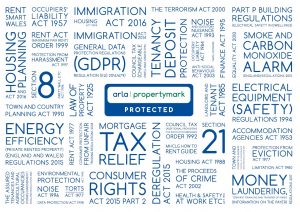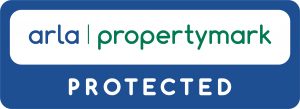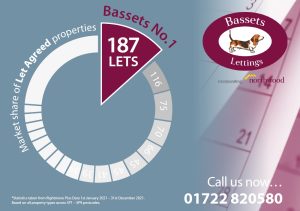With more and more legislation being introduced, we understand it makes it increasingly difficult for Landlords to keep up to date, ensuring they are fully compliant. Even though some of the legislation is not ‘statutory’, if anything does go wrong, then you may still end up with a fine or imprisonment.
It may well be better, therefore, to leave it to a professional letting agent to manage the whole process for you? If you choose one of our ‘Fully Managed’ Services, Northwood Inc Bassets will ensure you comply with current legislation save in the knowledge we are ARLA Propertmark members.

If you choose one of our ‘Tenant Find’ Services we’ll ensure the initial paperwork is correct but you will need to ensure you have an idea of the current regulations and how this will impact on your management of the tenancy?
Some of the legislation you have to consider.
Homes (Fitness For Human Habitation) Act 2018
The Homes (Fitness for Human Habitation) Act 2018, known as the Homes Act, replaces Section 8 of the Landlord and Tenant Act 1985 (LTA 1985) in England, with the purpose of improving living standards in the private and social rented sectors.
Gas Safety (Installation and Use) Regulations 1988*
Gas Safety Legislation is statutory. If you do not comply, then you are breaking the law and will be prosecuted- often resulting in a fine or imprisonment. Pipework, appliances and flues must be maintained in a safe condition. Gas appliances must be serviced regularly in accordance with the manufacturers’ instructions, or annually unless advised otherwise.
Furniture and Furnishings Fire Safety
Generally, we would recommend that you let the property unfurnished. The Furniture and Furnishings (Fire) (Safety) (Amended) Regulations 1993 require all upholstered furniture and furnishings (e.g. sofas, chairs, mattresses) supplied by the Landlord in rented properties to be fire retardant and to carry a fire retardant label. If a property fails to comply, the Landlord faces a fine or imprisonment. Generally, most furniture purchased after March 1990 should comply with the regulations and will be labelled accordingly.
Energy Performance Certificate, Ratings and Works*
Landlords of most properties (‘listed’ properties are excluded) must legally have a valid Energy Performance Certificate (EPC) before letting out their property. An EPC should cost less than £100, lasts for 10 years and we are happy to order one for you. Although the penalty is £200 a day if you are caught, we are unable to act for you without one.
From the 1st April 2018, any unlisted properties rented out in the private sector will have to have a minimum energy performance rating of E. For guidance on how to make sure your property is up to standard, visit: https://www.gov.uk/government/publications/the-private-rented-property-minimum-standard-landlord-guidance-documents. This now affects all tenancies from April 2020 including existing tenancies.
How to Rent Guide*
The Landlord must also provide Tenants with a copy of the Department for Communities and Local Government’s publication “How to rent: The checklist for renting in England” – available at www.legislation.gov.uk (Assured Shorthold Tenancy notices and Prescribed Requirements (England) Regulations 2015).
Electrical Safety -What do the Electrical Safety Standards in the Private Rented Sector (England) Regulations 2020 require?
The Regulations apply in England to all new tenancies from 1 July 2020 and all existing tenancies from 1 April 2021. You can read formal guidance at:
www.gov.uk/government/publications/electrical-safety-standards-in-the-private-rented-sector-guidance-for-landlords-tenants-and-local-authorities
Oil Safety
Oil storage tanks and supply pipework should be checked regularly for general conditions and any leaks repaired. There is no legal requirement to obtain an ‘oil’ safety certificate, however, BS5410: Part 1 requires all oil-fired appliances and equipment to be serviced regularly in accordance with the manufacturers’ instructions. Oil storage tanks and oil supply pipework should, therefore, be checked regularly for general condition and any leaks repaired. SO WE STRONGLY RECOMMEND AN ANNUAL SERVICE.
Smoke Alarms
It is law to fit one smoke alarm per floor when letting out a property. All properties built since June 1992 (and all Houses in Multiple Occupation (HMOs)) must be fitted with mains operated smoke detector/alarms and with at least one detector per floor. If the property was built prior to 1992, then the legal requirement is for Landlords to provide ‘long life’ smoke alarms on each floor.
Carbon Monoxide Alarms
Carbon Monoxide Alarms must be fitted in any room that is used partly or wholly as living accommodation which also contains any appliance which burns, or is capable of burning, solid fuel. This would include log and coal-burning (solid fuel) stoves and open fires, even if they are not normally in use. This does not include gas and oil boilers. If an open fireplace is purely decorative and not useable then it is not covered by the regulations.
Whilst gas is not solid fuel, we would strongly recommend a Carbon Monoxide Alarm is also fitted in all rooms with a gas appliance.
Glazing
Better to be safe than sorry, so it’s vital to fit safety and toughened glass where needed such as to a single glazed back door or internal glazed door near a staircase. To avoid serious injury, safety glass should be fitted in all doors, windows and glazed areas that are lower than 800mm from the floor level. Glass panels less than 250mm wide can be fitted with 6mm glass or laminated glass instead of toughened glass.
Legionnaires’ Disease
Landlords of residential accommodation have responsibilities for combating Legionnaires’ Disease. Health and safety legislation requires Landlords to carry out risk assessments for the Legionella bacteria which cause the disease and thereafter to maintain control measures to minimise the risk. Most rented premises will be low risk but it is important that risk assessments are carried out and control measures introduced. By way of example, Legionella bacteria could be found in cut off pipework or in an unused water supply.
Immigration Act 2014
All Landlords in England are obliged to check their Tenant’s status and Right to Rent. The government is making it harder for illegal immigrants to rent accommodation. The Immigration
Act 2014 introduced a requirement for Landlords of private rental accommodation to conduct checks to establish that new Tenants have the right to rent in the UK. Landlords who rent to illegal migrants without conducting these checks will be liable for a fine.
*Required to serve a Section 21 Notice to end an assured Shorthold Tenancy. All of these documents and certificates must have been provided to the Tenant first.
This list is not exhaustive but gives an idea of those important areas that you need to consider when renting your home.





 We conduct viewings 6 days a week (into the early evening) and will provide you with feedback on a regular basis.
We conduct viewings 6 days a week (into the early evening) and will provide you with feedback on a regular basis.







